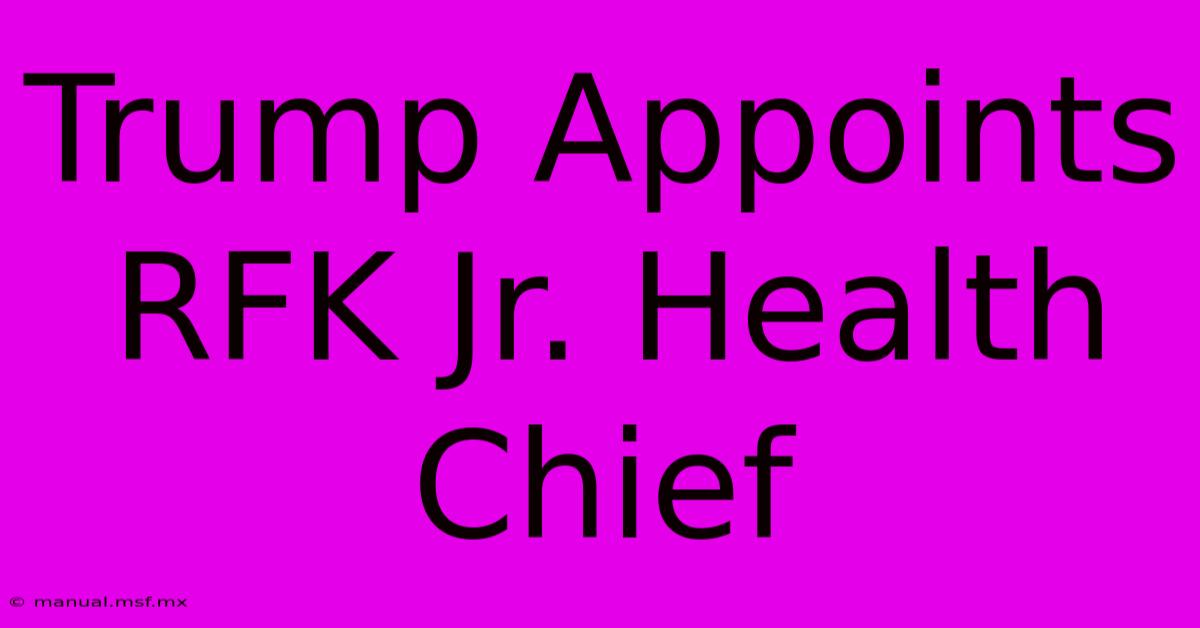Trump Appoints RFK Jr. Health Chief

Discover more detailed and exciting information on our website. Click the link below to start your adventure: Visit Best Website. Don't miss out!
Table of Contents
Trump Appoints RFK Jr. Health Chief: A Controversial Choice Sparks Debate
The appointment of Robert F. Kennedy Jr. as the head of a new White House office dedicated to "health freedom" has ignited a fierce debate, pitting concerns about his anti-vaccine stance against his reputation as an environmental advocate.
Editor Note: This appointment has garnered significant attention, raising questions about the direction of U.S. health policy.
The decision has drawn criticism from public health experts and medical professionals who point to Kennedy's vocal skepticism about vaccine safety, particularly in relation to autism. While his stance is deeply rooted in his personal beliefs, it contradicts the overwhelming scientific consensus on the safety and efficacy of vaccines.
This article explores the complex dynamics surrounding this controversial appointment, analyzing the potential implications for public health and examining the diverse perspectives that fuel this debate.
Analysis: We have meticulously researched public statements, scientific reports, and expert opinions to provide a comprehensive understanding of the controversy surrounding Kennedy's appointment. This article aims to present a balanced perspective by considering both sides of the argument, allowing readers to form informed opinions on this significant issue.
Key Takeaways from Robert F. Kennedy Jr.'s Appointment:
| Takeaway | Explanation |
|---|---|
| Controversy Over Anti-Vaccine Stance | Kennedy's skepticism about vaccines, particularly his concerns about autism, has fueled criticism from medical professionals and public health experts, who emphasize the scientific consensus supporting the safety and efficacy of vaccines. |
| Potential Impact on Vaccine Confidence | The appointment raises concerns about undermining public trust in vaccines, potentially leading to a decrease in vaccination rates and an increase in preventable diseases. |
| Health Freedom Movement | Kennedy's appointment reflects the growing movement advocating for greater personal autonomy in healthcare decisions, which often intersects with concerns about vaccine mandates and government regulations. |
| Complexities of Public Health Policy | This appointment highlights the complexities of navigating public health policy in the face of conflicting opinions and scientific uncertainties. |
| Need for Evidence-Based Decision-Making | The controversy underscores the importance of relying on scientific evidence and expert consensus in formulating health policy decisions, particularly when navigating sensitive and controversial topics. |
Health Freedom Movement
The appointment of Kennedy, a prominent figure in the health freedom movement, reflects a growing push for greater autonomy in healthcare decisions. Supporters of this movement advocate for individuals' rights to choose their own medical treatments, often citing concerns about government overreach and the potential for coercion.
This movement frequently intersects with skepticism towards vaccines, particularly when it comes to mandates and regulations. Those who believe in health freedom argue that individuals should have the right to refuse vaccinations based on their personal beliefs or concerns about potential adverse effects.
Public Health Concerns
Critics of Kennedy's appointment, however, highlight the potential negative impact on public health. They argue that his anti-vaccine stance could undermine trust in vaccines, leading to a decrease in vaccination rates and a resurgence of preventable diseases.
This fear stems from the understanding that herd immunity, achieved through widespread vaccination, is essential in protecting vulnerable individuals who cannot be vaccinated due to medical reasons. A decline in vaccination rates could leave these individuals at risk, potentially leading to outbreaks and increased healthcare costs.
The Future of U.S. Health Policy
The debate surrounding Kennedy's appointment raises crucial questions about the direction of U.S. health policy. It highlights the challenges of balancing individual autonomy with the public good, particularly in the face of conflicting scientific evidence and deeply held beliefs.
This controversy serves as a reminder of the need for transparent, evidence-based decision-making in formulating public health policies. Open dialogue, informed by scientific consensus and expert perspectives, is crucial for navigating these complex issues and ensuring the well-being of the nation.

Thank you for visiting our website wich cover about Trump Appoints RFK Jr. Health Chief . We hope the information provided has been useful to you. Feel free to contact us if you have any questions or need further assistance. See you next time and dont miss to bookmark.
Also read the following articles
| Article Title | Date |
|---|---|
| Paddy Mc Guinness Thanks Children In Need Donors | Nov 15, 2024 |
| Mike Tyson Vs Jake Paul Fight Schedule | Nov 15, 2024 |
| Lastebil I Snasa Delvis Under Vann Etter E6 Ulykke | Nov 15, 2024 |
| Video Atp Finals 2024 Sinner Vs Medvedev | Nov 15, 2024 |
| Alzheimer Lecanemab Wirkung And Anwendung | Nov 15, 2024 |
| Haaland Cetak Gol Lagi Norwegia Bekuk Slovenia | Nov 15, 2024 |
| Live Afc World Cup Qualifier Indonesia Vs Japan | Nov 15, 2024 |
| Nets Injury News Wednesdays Game | Nov 15, 2024 |
| Parliament Suspended For Maori Performance | Nov 15, 2024 |
| Lindsey Vonn Retour Sur Les Pistes A 40 Ans | Nov 15, 2024 |
